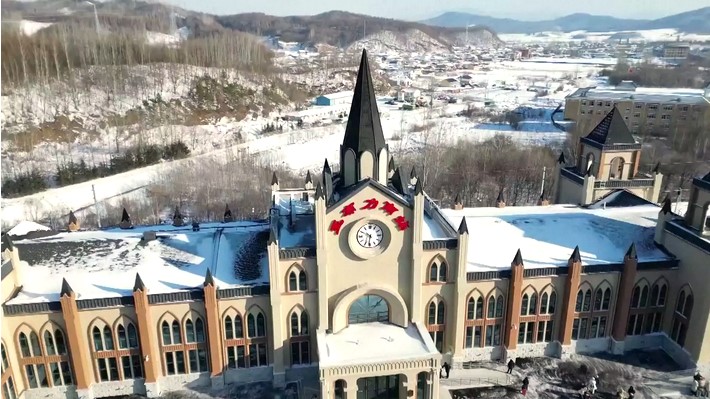YABULI (HARBIN), February 10th (AMSP/CGTN) – – The Ninth Asian Winter Games, which opened on Friday in Harbin — northeast China’s ‘Ice City’ — has sparked growing enthusiasm for winter tourism in Heilongjiang Province, which boasts exceptional ice and snow resources.
The surge in ice and snow tourism has revitalized local villages and attracted increasing numbers of visitors to Yabuli, the venue for the Games’ snow events, located about 200 kilometers from Harbin, the capital of Heilongjiang.
Just 500 meters from Yabuli South Station is a ski resort, and less than three kilometers away lies the competition venue. Here, visitors can not only witness the athletes’ skill up close but also experience the thrill and speed of winter sports firsthand.
Skiing enthusiasts from around the world flock to Yabuli to enjoy its 56 ski trails, which cater to all skill levels.
“I came all the way from Shanghai to Yabuli to try skiing. Since it hardly ever snows where I’m from, I’ve always wanted to experience what it’s like to glide across the snow,” said a tourist.
“Thanks to the Games, Yabuli’s winter tourism is booming, with daily visits now reaching 30,000, a rise of over 20 percent compared to the same period last year,” said Yang Xiaodong, director of the cultural and tourism management office of the Yabuli management committee.
To meet the surging demand for accommodation, the number of hotel and homestay rooms in Yabuli has increased from 1,539 to 2,473, offering a total of 5,140 beds.
Qingshan Village, situated near Guokui Mountain, is the closest village to the ski resort. In preparation for the Games, the village underwent a major transformation starting last year. Of its 300 households, more than 120 are now engaged in winter tourism-related businesses.
As a result, Qingshan Village has truly become the ‘first village’ at the foot of Yabuli Mountain.
“The people here are so welcoming, and the scenery is stunning. This is the first time I’ve ever seen such heavy snow,” said Li Shenghu, a tourist from Zhejiang Province in east China.
“There are now over a hundred homestays in this village. Many locals have converted their homes into homestays over the past year. We used to rely on farming and other traditional means of living, but now we’re running homestays, restaurants, and other businesses. We’re making more money than before,” said Song Wenli, a local homestay operator in Qingshan Village.
A common feature of Qingshan Village’s farm-style restaurants is that all ingredients come from the local specialties of the Yabuli Guokui Mountain forests. Wild mushrooms, black fungus, and wild vegetables from the mountains, along with free-range chickens, ducks, and geese raised in the forest, are favorites among diners. The cooking methods remain traditional, preserving the authentic, original flavors.
Thanks to the growth of winter tourism, nearly every household in Qingshan Village has found a way to benefit from the industry, with average annual incomes now reaching around 35,000 yuan (about 4,802 U.S. dollars) per person. The transformation of Qingshan Village reflects the broader development of Yabuli, which has risen to prominence through its skiing industry.
By capitalizing on this trend, Yabuli has unlocked new opportunities for growth, with the Asian Winter Games further fueling the region’s booming winter tourism industry.
Running from February 7 to 14, the Games have brought together 1,275 competitors from 34 countries and regions, making this the largest edition of the event in terms of overall participation.
amsp/cgtn-abp
CGTN

